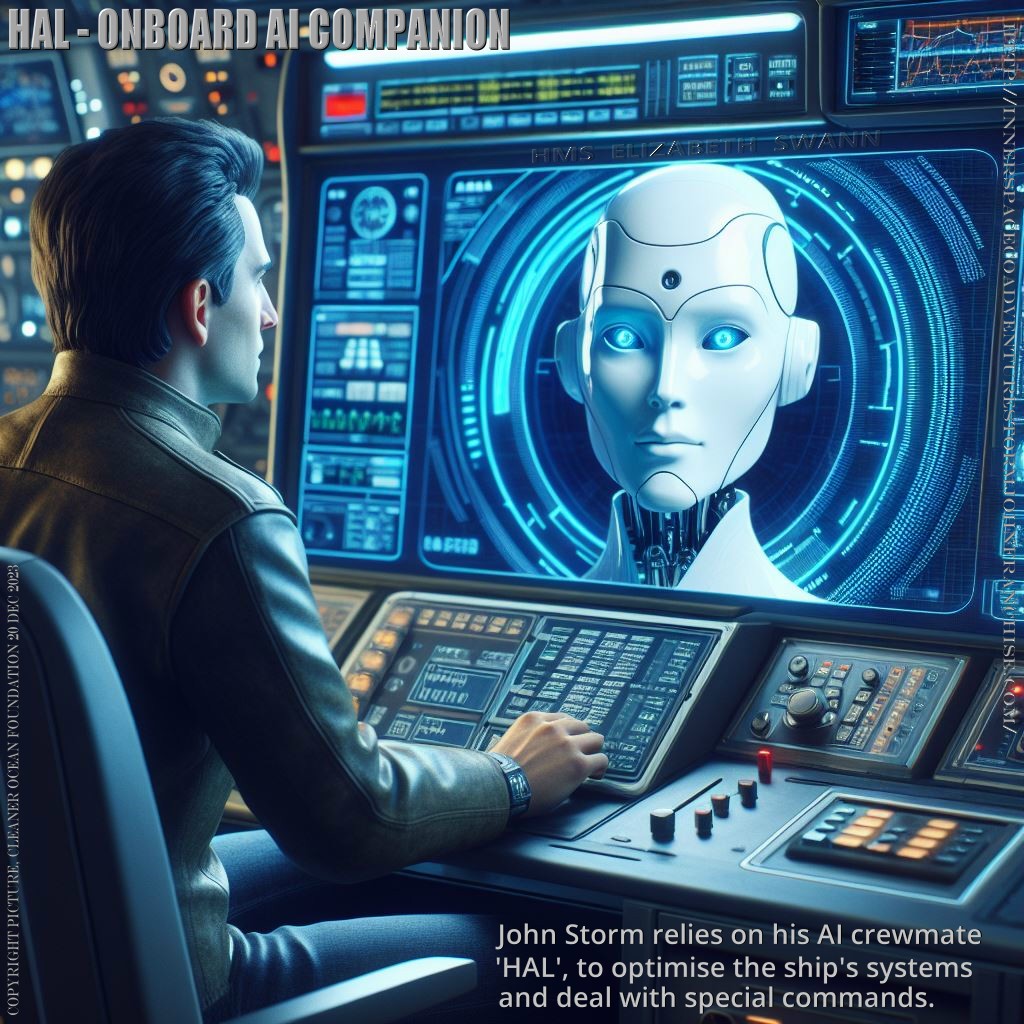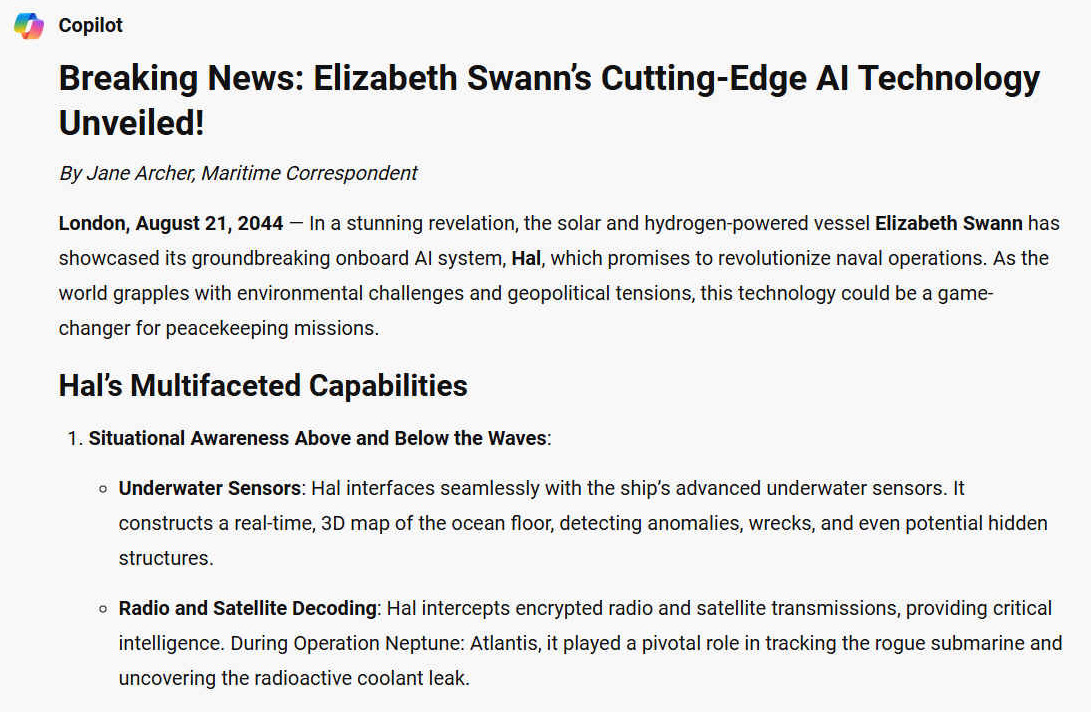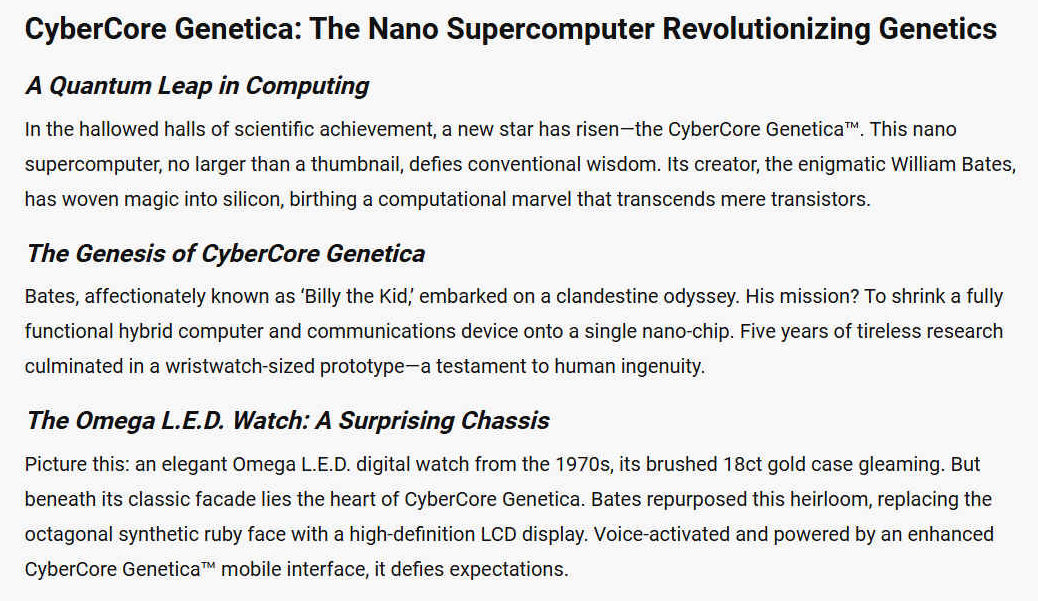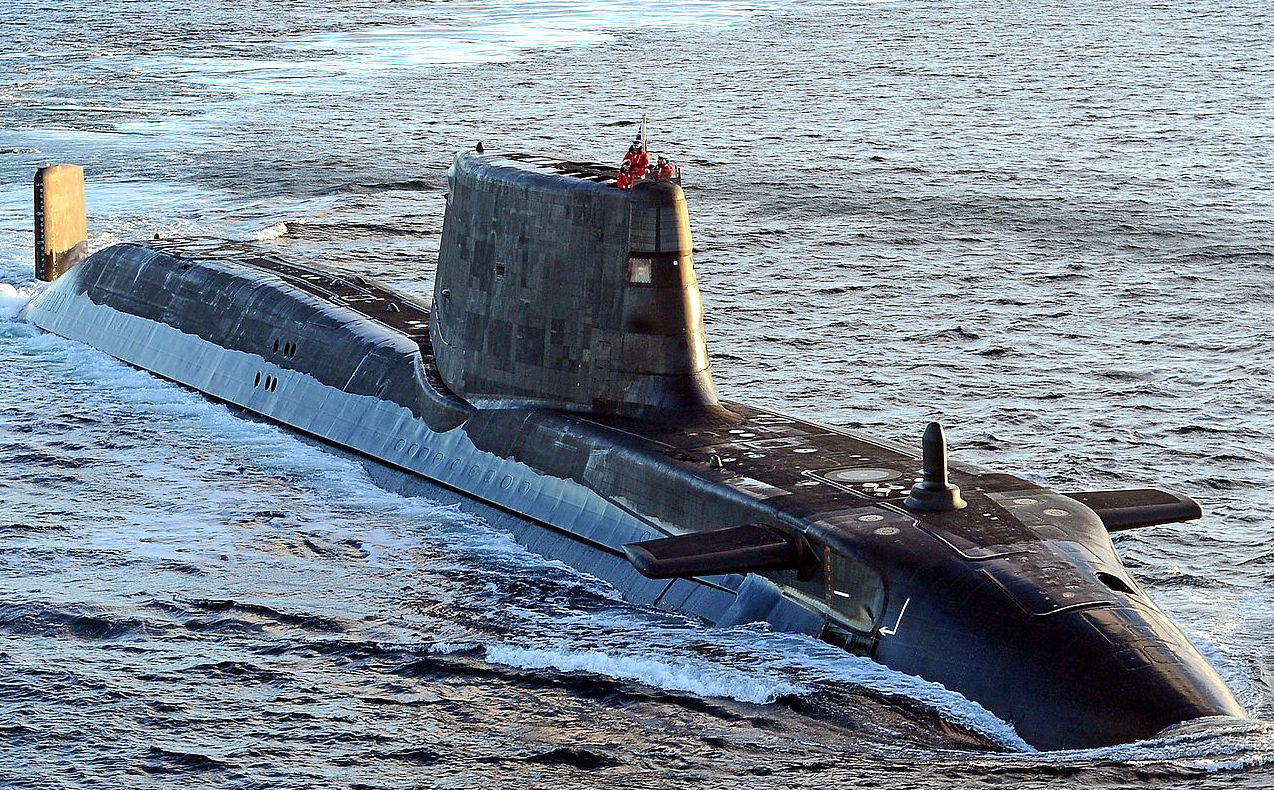|
THE
ARK
-
DNA VAULT DIGITAL TIME CAPSULE
ATLANTIS
STORY
MAP &
OPERATION HOMEPAGE

AI
COPILOT - Hal is the onboard AI system that serves as the brain and nervous system of the Elizabeth Swann, a solar and hydrogen-powered ship. This advanced AI is responsible for a wide range of functions, including:
1. Ship Systems Management: Hal oversees the operation of all onboard systems, from propulsion and navigation to energy management and environmental controls.
2. Human Interface: Hal interacts with the crew, providing information, responding to queries, and assisting with tasks. It acts as a central hub for communication and coordination.
3. Sensors and Systems: Hal is integrated with the ship's various sensors, including those for navigation, weather, and environmental monitoring. It processes and interprets this data to ensure the ship's safe and efficient operation.
John Storm's near obsession with collecting and converting DNA
samples of flora and fauna, led him to amass the world's
largest database. Long before that the Captain of the
Elizabeth Swann realised that he was running out of space
using conventional storage techniques. He had to find a way of
converting the DNA of his samples to digital code. But his
major breakthrough was an experiment to recreate the DNA from
stored digital data, back to a biological sample that could be
used to recreate the life from which it came.
This
was amazing technology that John kept a secret. The process
could have been patented, but the conservationist did not
trust corporations or governments to use it only for good. He
recalled Einstein,
Oppenheimer and nuclear fission - the Manhattan Project, and
how that had translated into first, bombs, and then nuclear
tipped ballistic missiles as a long range delivery system that
could destroy the planet many times over in the hands of
warmongering megalomaniacs. Meaning that nobody on earth was
truly safe. Because, as it turned out, those maniacs exist in China,
North Korea and Russia. And because of those threats, the USA,
Europe, India
and Pakistan all leaped into the fray as some kind of Freudian
competition to outdo each other in the death dealing
department.
When
publishing a patent,
you are disclosing the essentials of your innovation, for all
the world to emulate. No way, thought John. Most innovators
are ripped off by big business, who calculate to tie you up in
litigation knots for around 10 years as a strategy to steal
ideas. The famous case of Robert Kearns reminded him to avoid
all such temptations.
With
that in mind, John made it his mission in life to create a
Time Capsule, that could be used to recreate life on other
suitable planets by way of terraforming. The Time Capsule
would need to be self sewing, an autonomously activated
robotic device that would germinate when it detected suitable
environments. It was a way of saving life
on earth, should climate
change warm the planet sufficiently to boil the seas and
make deserts of land, so extinguishing all human achievements.
NASA
soon realised what John had, and along with the likes of DARPA
and other similar agencies in other nations all over the
world, they wanted a slice of the action for their space
exploration projects. But John would not entertain such
notions. Because of the inherent dangers when science is
weaponised.
"THE ELIZABETH SWANN'S DIGITAL NOAH'S ARK"
London, UK – A groundbreaking technological marvel aboard the Elizabeth Swann, known as the
ARK, is poised to revolutionize medicine and biology. This massive
DNA database, painstakingly curated by John Storm over his lifetime, holds a digital record of countless species from across the globe.
The ARK's digital interface allows for the generation or reconstruction of biological material based on the genetic code stored within. By harnessing the power of supercomputers, scientists can analyze and manipulate these genetic sequences, potentially leading to breakthroughs in various fields.
One promising application of the ARK lies in the realm of cancer treatment. By studying the genetic makeup of cancerous cells, researchers can identify specific mutations contributing to the disease. Using
CRISPR technology, a gene-editing tool, scientists may be able to correct these mutations and potentially eliminate cancer cells.
Beyond cancer,
the ARK could be used to enhance traits of various species. For example, by modifying the genetic code of crops, scientists might develop strains that are more resistant to pests, drought, or disease. Similarly, genetic engineering could be applied to livestock to improve their yield, health, or nutritional value.
The ARK's potential benefits extend far beyond Earth. As humanity ventures into space, this digital repository of genetic information could be invaluable for establishing self-sustaining colonies on other planets. By using the ARK to create artificial ecosystems and produce essential resources, future generations may be able to thrive in extraterrestrial environments.
The Elizabeth Swann's 'ARK' represents a significant leap forward in biotechnology. Its ability to store, analyze, and manipulate genetic information offers hope for addressing some of the world's most pressing challenges, from curing diseases to ensuring the survival of our species.
THE ARK AS A GENETIC TREASURE TROVE
Let’s delve further into the fascinating world of the ARK - a DNA database like no
other - aboard the solar-powered vessel, the Elizabeth Swann.
Collecting the Threads of Life
John Storm, a tireless amateur anthropologist and geneticist, has dedicated his life to assembling an unparalleled repository of genetic information. The ARK, residing securely within the Elizabeth Swann, houses this vast compendium of DNA samples. Storm’s journey began in his youth, and over the years, he meticulously gathered genetic material from every corner of our planet. His mission? To preserve the essence of life itself.
The Secure Vault
The ARK is no ordinary database. It’s a fortress against time, safeguarded against would-be thieves. Its encryption layers rival those of the most secretive intelligence agencies. Storm’s unwavering commitment ensures that this genetic treasure trove remains intact, immune to the ravages of entropy.
The Digital Interface: Unleashing Genetic Potential
But what sets the ARK apart is its digital interface. Imagine a virtual laboratory where the building blocks of
life - the A, T, C, and G nucleotides - are manipulated with precision. Using supercomputers, Storm’s team can generate or reconstruct biological material, akin to assembling a complex jigsaw puzzle. The Genome code - the blueprint of life - is their canvas.
Editing the Code
Here lies the true marvel: the ability to edit the Genome. Bad
code - mutations, disease-causing variants - can be excised. Imagine a world where cancer’s genetic triggers are snipped away, leaving healthy cells unscathed. The ARK’s CRISPR-based editing system wields molecular scissors, selectively altering genes to enhance traits or eradicate vulnerabilities.
A Medical Toolkit for the Future
The implications are staggering. The ARK could revolutionize medicine.
Cancer treatments tailored to an individual’s unique genetic makeup. Crop enhancements that defy pests and climate extremes. But it doesn’t stop there. The ARK might be humanity’s ticket to the stars - a genetic payload for interstellar colonization. Imagine life on distant planets, seeded by the ARK’s carefully curated DNA.
Closing Thoughts
John Storm’s legacy transcends mere data. It’s the promise of a healthier, more resilient future. As the Elizabeth Swann sails through the cosmic sea, the ARK remains our
beacon - a testament to human curiosity, resilience, and the boundless potential encoded within our genes.
Note: The Neo-Nazis’ interest in the ARK remains a curious
subplot - one that underscores the database’s allure even among the most unlikely of seekers.
Disclaimer: The ARK, as described here, is a fictional construct. While real-world genetic research holds immense promise, we have yet to create such a comprehensive database aboard a solar-powered
ship, or anywhere for that matter.


THE
ELIZABETH SWANN
The Elizabeth Swann is autonomously piloted by
Captain
Nemo, named after the Captain of the Nautilus in Jules
Verne's classic: 20,000 Leagues Under the
Sea. A stand alone unmanned navigation system.
The
Swann is a virtual super-fortress, armed with Merlin,
Excalibur and Pendragon air and water defense systems, and
Hal AI™, the onboard supercomputer that ensures all threats
to the safety of the trimaran ship are eliminated. And that
includes cyber attacks as well as the use of force and
weapons.
As
an artificial intelligence, Hal was spellbound when John
accidentally becomes a super-human when injected with a CRISPR
virus in Manaus, while rescuing his friend Charley Temple from
a group of scientists, who managed to clone Cleopatra,
the last Pharaoh Queen of Ancient Egypt. Hal noted
the increase in his Captain's strength
and increased intelligence, that helped him to rescue Cleopatra from the
CIA.
OPERATION
NEPTUNE CAST:
|
CHARACTERS:
PROTAGONISTS
|
DESCRIPTION
|
|
|
|
|
Admiral
Lawrence Francis Percival
|
First
Sealord, British
Royal Navy
|
|
Antonio
Guterres
|
United
Nations' Secretary General
|
|
ARK,
The
|
The
world's most comprehensive interactive DNA
database
|
|
Benjamin Reid Blakestone RN
|
Submariner
Commander
HMS Neptune (Captain)
|
|
BioCore™
|
A
digital communication interface for the human brain
|
|
Captain
Nemo
|
AI
onboard computer system
|
|
Charley
Temple
|
Reporter
& camerwoman,
who Sussex
police harass & arrest
|
|
CyberCore
Genetica™
|
The
world's smallest, fastest & most powerful
supercomputer
|
|
Dale
(Henrietta) Julianus
|
Honest
barrister defending Terramentals at the Old Bailey
|
|
Dan
Hawk (Daniel)
|
Electronics
& computer wizard, crew member
Elizabeth Swann
|
|
Dr
Roberta Treadstone
|
Blue
Shield, Antiquities expert, Newcastle University, England
|
|
Edward
(Honest John) Thomas
|
Honest British Prime Minister,
Rt Hon MP Member Parliament
|
|
Elizabeth
Swann
|
Fastest
solar/hydrogen ship & floating laboratory
|
|
Excalibur,
Pendragon & Merlin
|
Anti
piracy weapon & ship security system
|
|
George
Franks
|
Legal
and intelligence trust manager, Swindles
& Gentry
|
|
HAL
|
The
onboard AI Copilot supercomputer ship
systems manager
|
|
Jill
Bird
|
BBC news anchor - Evidence proves
innocence Terramentals
|
|
John
Storm
|
Ocean
adventurer, marine
archaeologist, Commander
RN
|
|
Katy,
Kitty
|
The
ships cat and lucky mascot
|
|
King
Charles III
|
Beleaguered
Monarch wrestling with UK corruption
|
|
Kitack
Lim
|
Secretary
General, International Maritime Organization (IMO)
|
|
Nautilus
|
Elizabeth
Swann's onboard survey ROV
|
|
Plato
|
Aristocles
- Ancient Greek philosopher who wrote about Atlantis
|
|
Professor
Douglas Storm
|
John
Storm's uncle, designer
of Elizabeth Swann
|
|
Professor
Jacques Pierre Daccord
|
UNESCO sunken
realms commission, Paris,
France
|
|
Richard Leon (Lionheart) Engelheart
|
Lieutenant,
a
brave submariner
HMS Neptune
|
|
Sam
Hollis
|
BBC
& Sky freelance investigative reporter Caribbean
regions
|
|
SSN
Neptune
|
Stricken
Astute nuclear sub with Spearfish torpedoes
|
|
Steve
Green
|
Freelance
reporter, friend of Charley Temple
|
|
Suki
Hall
|
A
marine biologist, admirer of John's work
|
|
Tom
Hudson
|
Sky
News Editor, always looking for an exclusive
|
|
Trisha
Lippard
|
Cleopatra's
call sign to protect her royal identity
|
|
William
(Bill) Fennick Windsor
|
Midshipman,
HMS Neptune (Kings College, Uni, London)
|
|
William
Liam Wallace
|
Scottish
director BAE Systems, MOD contractor, whistleblower
|
|
|
|
|
CHARACTERS:
ANTAGONISTS
|
DESCRIPTION
|
|
|
|
|
Bartram (Sly) Fox
|
Crafty
compact acrobatic subaqua diver Terramental - ‘Sly Fox’
|
|
Bobby
Bo Dallas
|
Navigator
handy Terramental, biologist, video evidence
|
|
Don
(Donald) Malcolm Campbell
|
Chief
Executive Babcock, MOD subcontractor
|
|
Harry
(Dirty) Hallem Holland
|
Chief
Constable - Scotland Yard (Metropolitan Police)
|
|
Inspector
Shaun Flanagan
|
Dirty
Harry's sidekick, (DI) fraud squad cover
ups
|
|
Jorges
Francisco Dicaprio
|
Cuban
freedom fighter & Predator submersible designer
|
|
Judge
Josephine Staker Cedrics
|
Corrupt
criminal court circuit Judge,
easily bribed with favours
|
|
Lord
(Byron Gideon) Everington
|
Ruthless
North Sea oil magnate, Conservative peer
|
|
Maximilian
(Maxy) Mohune
|
Pilot of mini sub, ex air force,
SAS hard man
Terramental
|
|
Nick
(The Devil) Johnson MP
|
Corrupt
UK Minister for Defence,
oil investor
|
|
Redan
(Red) Simdo
|
Leader
Terramentalists
(Oxford grad. 35 tall dark Arabian)
|
|
Padgett
Henry Francis KC
|
A
corrupt barrister, CPS prosecutor, Kings Counsel
|
|
Predator
HK
|
A
high speed hunter-killer submersible
|
|
Sergeant
Gordon Scotford
|
Corrupt
Met cop who sexually assaulted & beat Zera Masken
|
|
Sir
Rodney Vernon Dunbar
|
MI6
military intelligence (General) oil investor
|
|
Terramentals
|
A
group of protestors driven to extreme activism
|
|
Zera Charlotte Masken
|
Stunningly
attractive climate obsessed Terramental
|
|
Zinzi Penelope Diana
|
Saudi
demure Terramental scientist (Lady Penelope)
|
|
|
|
In the John
Storm series of ocean awareness
adventures, the extreme activists use their Predator HK to
steal an Astute
class submarine, belonging to the British
Royal Navy. The anti global warming terrorists plan to steal US and
Soviet submarines, as part of their agenda to prove the
futility of all out thermonuclear annihilation. Using their
own illegal, weapons against the perpetrators of what they see
as crimes against humanity.
In
this fictional John
Storm adventure, the Astute submarine commandeered,
develops radiation leaks, making the vessel dangerous to life
in the ocean, and eventually, those submariners operating the
vessel, adding to the list of complaints of the
Terramentalists.

CHARACTERS
|
GOLD |
MEDIA |
MOVIES |
SCREENPLAY |
SUBMARINES
This
website is Copyright © Cleaner
Oceans Foundation Ltd., August 2024. Asserted as per the Berne
Convention.
In
this fictional story, the characters and events are the
product of the author's imagination.
|



